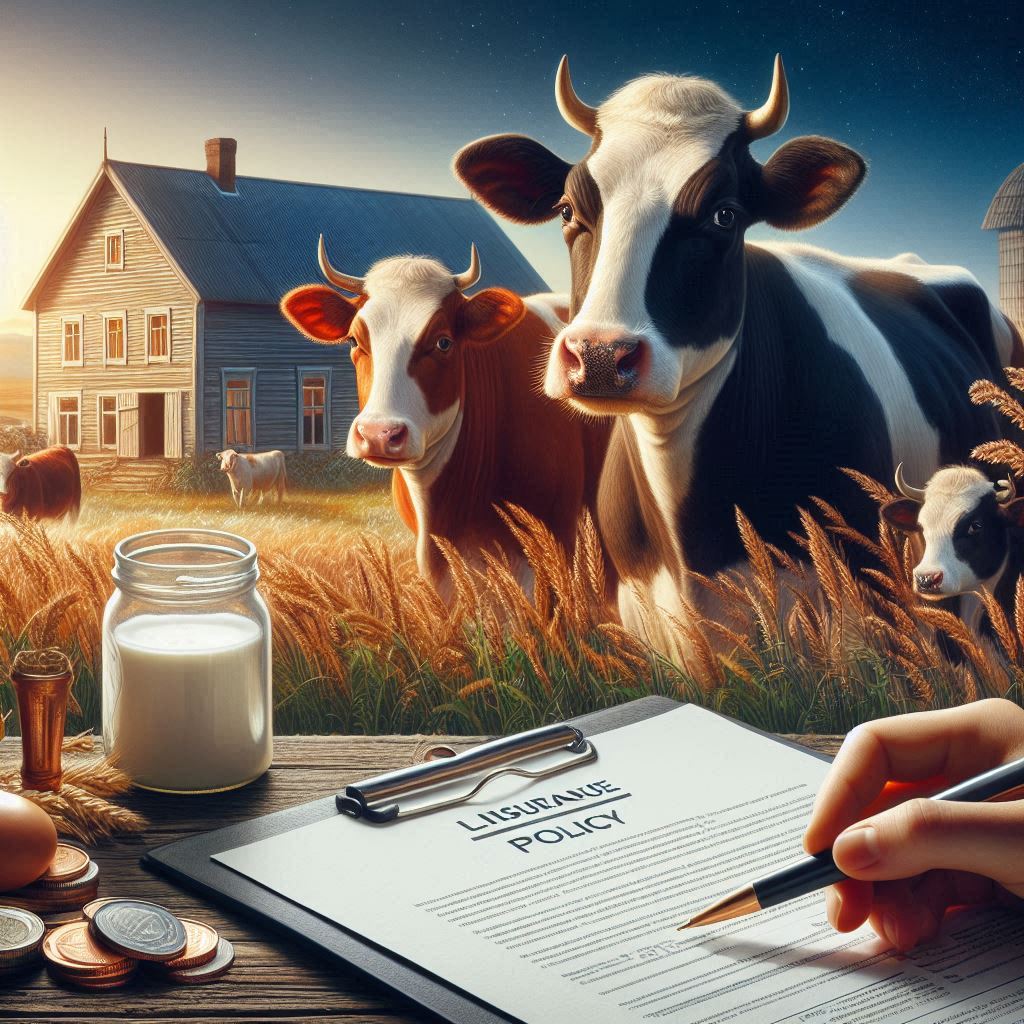Finding ways through the unpredictable nature of farming, especially in flourishing agricultural fields, can be a highly challenging task without the right protection, and with the right livestock insurance policy, you are equipped with an essential risk management instrument that offers comprehensive farm animal insurance. These policies provide crucial financial coverage against a number of risks including unpredictable weather patterns and disease outbreaks. Understanding how livestock insurance works can help you make informed decisions to protect your investment.
You might wonder about the benefits of livestock protection policies. They represent not just a financial safeguard but also a commitment to sustainable farming practices and a balanced environment. By choosing the right livestock protection plan, you ensure that your farm is resilient against the challenges while contributing to a sustainable ecosystem. Livestock policy coverage options are flexible, catering to varying needs and offering solutions applicable, or, so to speak, customized to the unpredictability intrinsic to farming.
Moreover, the expansion of agricultural insurance coverage is becoming more prevalent as farmers and policymakers acknowledge the importance of eco-friendly agricultural practices. By integrating pest and disease management, you can rest assured that your livestock remains secure under the blanket of a comprehensive policy. Let’s examine deeper into sustainable farming practices to understand this insurance policy provisions better, fostering a sense of security amid unpredictable weather events.
Key Takeaways
- Livestock insurance policies provide important financial protection.
- Benefits of livestock insurance include managing farming risks.
- Coverage options are adaptable, supporting sustainable practices.
Understanding Livestock Insurance
Livestock Insurance Policy plays a pivotal role in safeguarding the financial well-being of farmers by providing protection against various risks such as diseases and natural disasters. Effective livestock insurance relies on comprehensive understanding and adoption, which promotes a sustainable ecosystem and encourages eco-friendly agricultural practices for a balanced environment.
How Livestock Insurance Works
Well, these insurance policies serve as essential risk management instruments for farmers. They provide crucial financial coverage against the unpredictable nature of farming, ensuring safety nets against losses from natural disasters, disease outbreaks, or theft. By understanding these insurance policy mechanisms, you can choose the right livestock protection plan suitable to your needs.
Specifically, these policies generally involve regular premium payments that cover specified livestock policy coverage options. Depending on the plan, the coverage might protect against specific risks like unpredictable weather events or losses in flourishing agricultural fields. The insurance essentially acts as a safety net or simply safeguard, allowing for sustainable farming practices despite the challenges posed by unpredictable weather patterns.
Comprehensive Farm Animal Insurance
Choosing the right livestock protection plan involves evaluating the benefits of livestock insurance policies and understanding the breadth of coverage. Comprehensive farm animal insurance is designed to cover a wide range of farm animals, including cattle, goats, and sheep, thereby providing peace of mind.
Such policies ensure integrated pest and disease management and support the expansion of agricultural insurance coverage. By adopting these measures, you contribute to a balanced environment and promote eco-friendly agricultural practices. This approach not only boosts the resilience of your farming operations but also enhances the long-term sustainability of the agricultural efforts that you would put in during the process.
Livestock Insurance Policy Details and Coverage

When examining a livestock insurance policy, you’ll discover various coverage options that cater to diverse farming needs. Such policies offer crucial financial coverage and support sustainable farming practices by reducing risks associated with livestock management.
Livestock Policy Coverage Options
These insurance policies provide several coverage options customized to the needs of farmers and ranchers. These options often include protection against natural calamities, disease outbreaks, and accidental injuries. By ensuring livestock is safeguarded against such unpredictable events, you can maintain a flourishing agricultural field even amidst challenges.
Moreover, comprehensive farm animal insurance safeguards your investments, offering compensation for losses to ensure uninterrupted farm operations. Embracing this type of protection facilitates eco-friendly agricultural practices, which contribute to a balanced environment and a sustainable ecosystem.
Choosing the Right Livestock Protection Plan
Opting for the right livestock protection plan involves understanding livestock insurance policies and matching them with your farm’s specific requirements. Consider factors like the type of livestock you manage, your farm’s location, and the local unpredictable weather patterns. This can help you tailor a plan that offers essential risk management instruments.
So, try to go for a plan that complements your farm’s expansion of agricultural insurance coverage and integrates pest and disease management strategies. By doing so, you protect your assets against the unpredictable nature of farming while supporting sustainable farming practices and adaptation to unpredictable weather events.
Risk Management and Financial Stability
In fact, these types of insurance policies play a pivotal role in protecting farmers from the unpredictable nature of farming. These policies help enhance financial stability by covering potential losses due to erratic weather patterns and unforeseen challenges in agriculture. By understanding livestock insurance policy options, you can better manage risks and maintain a sustainable ecosystem.
Expansion of Agricultural Insurance Coverage
With the expansion of agricultural insurance coverage, farmers can secure their livelihoods against various risks. These policies are designed to alleviate the impacts of unpredictable weather events that can devastate crops and livestock alike. As farming becomes increasingly vulnerable to climate change, having access to comprehensive farm animal insurance is crucial. Not just that, in order to understand livestock insurance policy properly, you need to go deeper into the insights of its provisions and exclusions equally.
Additionally, insurance policies of this kind are not limited to weather-related risks. They also cover scenarios like integrated pest and disease management, offering you protection against pests and diseases that may jeopardize your farm. This comprehensive approach ensures that critical aspects of your agricultural operations are secure, thus supporting flourishing agricultural fields.
Essential Risk Management Instrument

Livestock insurance serves as an essential risk management instrument for farmers, providing crucial financial coverage during times of need. Given the unpredictable nature of farming, these policies are indispensable in ensuring stability and continuity. They help you navigate challenges that arise when adopting eco-friendly agricultural practices as well as maintaining a balanced environment—the latter two are crucial, but incorporating them requires an immense level of skill set.
Choosing the right livestock protection plan ensures that you are covered for various eventualities. Understanding livestock insurance policy details means you can select policy coverage options that best suit your farm’s needs. This strategic decision-making leads to sustainable farming practices, promoting long-term viability and resilience against uncertainties in agriculture.
Conclusion
Steering through the complexities of insurance policy involves a web of details, benefits, and potential challenges. In order to understand livestock protection policy, you need to put together how livestock insurance works with comprehensive farm animal insurance and coverage options. These elements are your allies in securing a balanced environment amid unpredictable weather events.
Consider the benefits of livestock insurance policies—they provide crucial financial coverage against unexpected losses. Such policies are an essential risk management instrument, ensuring the farm’s resilience to the unpredictable nature of farming. The better you understand livestock insurance policy intricacies, the more secure your investment in livestock will be.
A reliable policy can help you maintain sustainable farming practices and eco-friendly agricultural practices. As you choose the right livestock protection plan, it’s also vital to keep an eye on the expansion of agricultural insurance coverage. This expansion not only covers livestock but also complements flourishing agricultural fields and promotes a sustainable ecosystem.
To foster a sustainable agricultural future, livestock policy coverage options are designed to enhance your farm’s ability to adapt to unpredictable weather patterns. Engage with integrated pest and disease management to ensure your farm thrives despite environmental challenges. The scope of these policies could be what sets your farm apart, helping you manage risks with confidence and efficiency.
By embracing a livestock insurance policy, you fortify your farm against uncertainties, securing a promising future for both your livestock and your land.
Frequently Asked Questions
Navigating the world of these insurance policies can be complex. Understanding the intricacies of these policies can help you choose suitable protection for your farm animals while supporting eco-friendly agricultural practices. We’ll explore specific perils covered, differences between policy types, risk management instruments, coverage impacts, and the benefits related to unpredictable weather patterns while going through different types of questions along with the answers illustrated in the following manner:
Q1. What specific perils are typically covered under a comprehensive farm animal insurance policy?
Comprehensive farm animal insurance often covers risks like accidents, illnesses, and theft. It can also include protection against natural disasters such as floods or droughts, safeguarding your livestock against unpredictable nature of farming. By choosing the right livestock protection plan, you ensure crucial financial coverage for your assets.
Q2. How do livestock mortality insurance policies differ from general livestock insurance policies?
Livestock mortality insurance specifically addresses the death of animals. In contrast, general insurance policies for livestock might cover additional aspects like injury, disease outbreaks, or loss due to theft. Understanding how livestock insurance works is crucial in selecting the right plan for your agricultural business needs.
Q3. In what ways can livestock insurance serve as an essential risk management instrument for farmers?
As an essential risk management instrument, livestock insurance provides a safety net against potential losses. By incorporating integrated pest and disease management, it helps maintain a sustainable ecosystem and supports the expansion of agricultural insurance coverage.
Q4. Could you explain how the choice of livestock policy coverage options can impact the sustainable farming practices of an agricultural business?
Choosing appropriate livestock policy coverage options supports sustainable farming practices by encouraging investment in eco-friendly agricultural methods. This promotes a balanced environment and long-term viability for agricultural fields. It ensures continuity in the face of environmental challenges.
Q5. What are the benefits of livestock insurance policies in mitigating the financial risks associated with unpredictable weather events?
Actually, these insurance policies offer vital protection against financial risk from unpredictable weather events, safeguarding your investments. Such coverage allows farmers to prepare for unpredictable weather patterns, ensuring that losses are minimized and financial stability is maintained.
Q6. To what extent does livestock insurance contribute to maintaining a balanced environment amidst the unpredictable nature of farming?
By providing financial security against various risks, livestock insurance supports a balanced environment. It encourages responsible farming practices, enabling farmers to invest in sustainable and environmentally friendly techniques even amid the unpredictable nature of farming. So, the livestock insurance policy fosters thriving ecosystems and flourishing agricultural fields.
Disseminate to help all!



